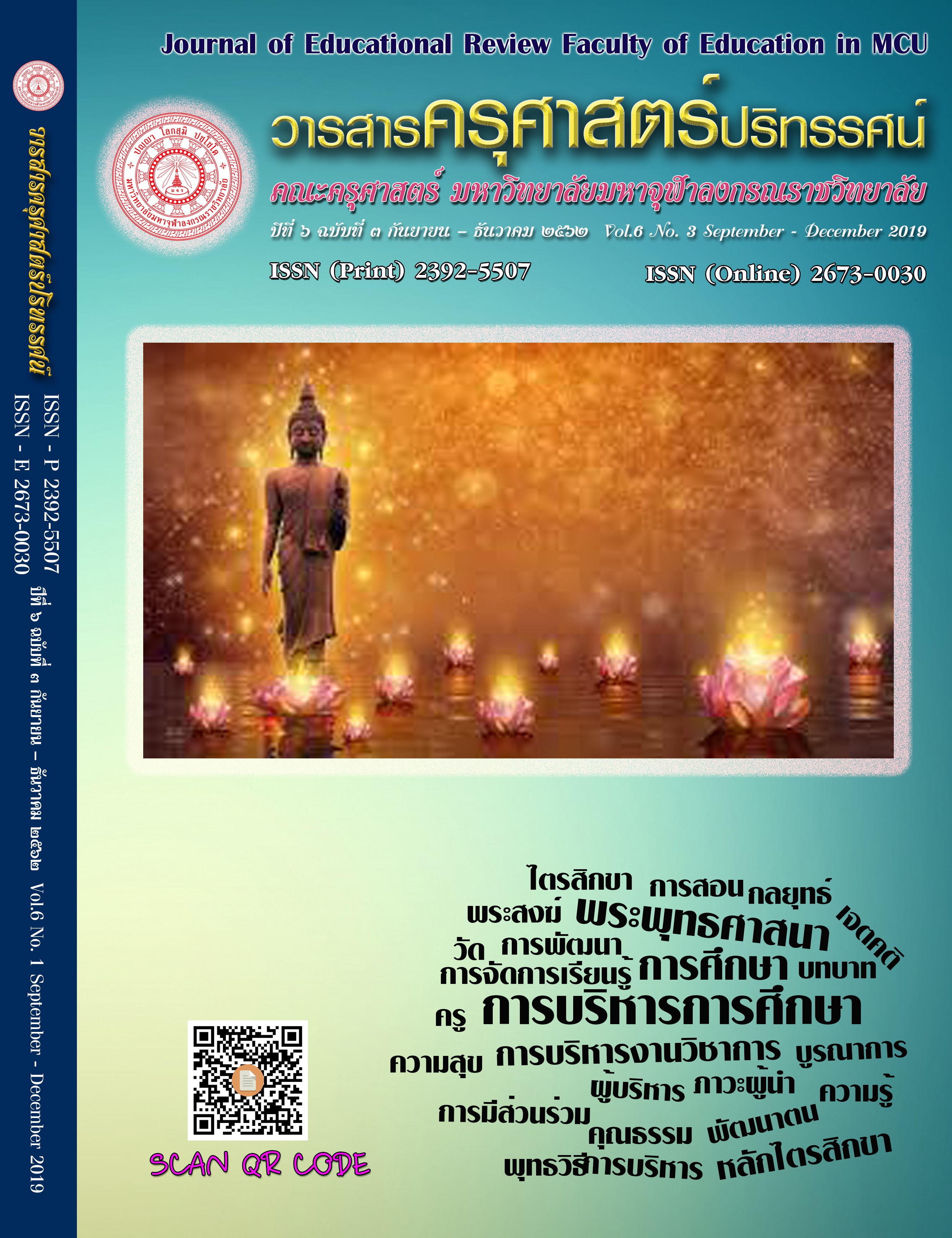THE DEVELOPMENT OF ACADEMIC ADMINISTRATION TO ENHANCE THE PERFORMANCE OF LEARNERS IN THE 21ST CENTURY'S OFFICE OF NON-FORMAL EDUCATION AND INFORMAL EDUCATION
Main Article Content
Abstract
The purpose of this research was to study the characteristics of the academic administration model for creating and evaluating the academic administration model in the 21st century of the Office of Non-formal education and Informal education. By conducting 4 steps of research: 1) the study of theory, theories related to non-formal education, academic administration and educational management in the 21st century, then analyzing the content, 2) non-formal education interview samples used in the research of 5 people, how to choose the form by open-ended interview, data analysis by content analysis.3) Developing the academic administration model to enhance the performance of students in the 21st century of the Office of Non-Formal and Informal Education. By using Delphi technique, 3 times of samples, 17 experts in educational administration and non-formal education by using a semi-structured interview and the questionnaire which is a 5-level estimation model. The statistics used in the analysis are median data, inter-quartile range.4) Evaluation of the academic administration of non-formal education to enhance the performance of students in the 21st century of the Office of Non-Formal and Informal Education Promotion Examples used in the research are Center administrators and teachers, non-formal and informal education, 364 people, multi-stage random sampling Which uses a questionnaire that is a 5-level estimation model with content validity between 0.60-1.00 and has a confidence value of 0.99Statistics used in data analysis were percentage, mean and standard deviation. The result shown that 1) The elements of the academic administration model to enhance the performance of students in the 21st century of the Office of Non-Formal and Informal Education Promotion It is found that it consists of 5 components, which is the first element. The curriculum has sub-elements, namely, principles, destinations, goals, assessment, learning, transfer, comparison, level, and network partners. Element 2 Learning management methods There are sub-elements Capture students as important. And various skills development activities.Element 3: Media development, technological innovation and learning resources for education There are sub-elements which are modern technology innovation media. And various learning resources Element 4 Teacher / Instructor Development There are sub-elements Teacher Performance Instructor development And learning management of teachers And element 5, educational quality assurance There is a sub-element which is the learner, the instructor, the learning management. Media and learning resources And management 2) What forms of education academic administration system to maximize the performance of our students in the 21st Century 21 Office promotes education and educational system individually composed course 5. How to manage the media, development, technological innovation, learning, and learning resources for education.The development of teachers/instructors and quality assurance studies. 3) Evaluation model of academic education system to enhance the performance of students in the 21stCentury 21 Office promotes education and education systems individually. Found to be appropriate and possible in many levels.
Article Details
ทัศนะและความคิดเห็นที่ปรากฏในบทความในวารสารฉบับนี้ถือเป็นความรับผิดชอบของผู้เขียนบทความนั้นเพียงผู้เดียว และไม่ถือเป็นทัศนะและความรับผิดชอบของกองบรรณาธิการ
กองบรรณาธิการขอสงวนสิทธิ์ในการคัดเลือกบทความลงตีพิมพ์และจะแจ้งให้เจ้าของบทความทราบหลังจากผู้ประเมินบทความตรวจอ่านบทความแล้ว
ต้นฉบับที่ได้รับการตีพิมพ์ในวารสารครุศาสตร์ปริทรรศน์ คณะครุศาสตร์ มหาวิทยาลัยมหาจุฬาลงกรณราชวิทยาลัย ถือเป็นกรรมสิทธิ์ของคณะครุศาสตร์ มหาวิทยาลัยมหาจุฬาลงกรณราชวิทยาลัย ห้ามนำข้อความทั้งหมดหรือบางส่วนไปพิมพ์ซ้ำ เว้นเสียแต่ว่าจะได้รับอนุญาตจากมหาวิทยาลัยฯ เป็นลายลักษณ์อักษร
References
กระทรวงศึกษาธิการ. (2550). พระราชบัญญัติส่งเสริมการศึกษานอกระบบและการศึกษาตาม อัธยาศัย พ.ศ. 2551. สํานักงานส่งเสริมการศึกษานอกระบบและการศึกษาตามอัธยาศัย. สํานักงานปลัดกระทรวง.
กระทรวงศึกษาธิการ. (2552). หลักสูตรแกนกลางการศึกษาขั้นพื้นฐานพุทธศักราช 2551. สาขามนุษยศาสตร์สังคมศาสตร์และศิลปะ ปีที่ 9 ฉบับที่ 3. กรุงเทพฯ: โรงพิมพ์ชุมนุมสหกรณ์การเกษตรแห่งประเทศไทย จํากัด.
กระทรวงศึกษาธิการ. (2554). การประกันคุณภาพของสถานศึกษา. กรุงเทพ: โรงพิมพ์คุรุสภา ลาดพร้าว.
กษม โสมศรีแพง. (2554). การพัฒนารูปแบบการเสริมสร้างพลังอำนาจการบริหารงานวิชาการในสถานศึกษาขั้นพื้นฐานขนาดเล็ก. วิทยานิพนธ์ (กศ.ด. การบริหารและพัฒนาการศึกษา) มหาวิทยาลัยมหาสารคาม,
เพชริน สงค์ประเสริฐ. (2550). การพัฒนารูปแบบการบริหารงานวิชาการโดยยึดหลักการทำงานเป็นทีมในสถานศึกษาขั้นพื้นฐาน. วิทยานิพนธ์ การศึกษาดุษฏีบัณฑิต (การบริหารการศึกษา) มหาวิทยาลัยนเรศวร
วิจารณ์ พานิช. (2555). วิถีสร้างการเรียนรู้เพื่อศิษย์ในศตวรรษที่21. กรุงเทพฯ: มูลนิธิสดศรี-สฤษดิ์วงศ์.
สำนักงานเลขาธิการสภาการศึกษา. (2553). การติดตามและประเมินผลความก้าวหน้าการดําเนินงานด้านการจัดการเรียนรู้ปี 2549-2550. กรุงเทพฯ: เพลินสตูดิโอ จํากัด.
สำนักงานเลขาธิการสภาการศึกษา. (2552). ข้อเสนอการปฏิรูป การศึกษาในทศวรรษที่สอง (2552-2561). กรุงเทพฯ: พริกหวานกราฟฟิค.
สำนักงานส่งเสริมการศึกษานอกระบบและการศึกษาตามอัธยาศัย. (2561).ร่างยุทธศาสตร์และ จุดเน้นการดำเนินงาน ประจำปีงบประมาณ พ.ศ. 2561. กรุงเทพฯ.
สํานักงานการศึกษานอกระบบและการศึกษาตามอัธยาศัย. (2551). กศน: นโยบายและจุดเน้นการดําเนินงานสํานักงานกศน. ประจําปีงบประมาณ พ.ศ. 2540. กรุงเทพฯ: ไทยพับบริค เอ็ดดูเคชั่น.
Translated Thai Reference
Kamon Phuprasert. (2001). Academic administration in educational institutions. Bangkok: Tips for Publication.
Ministry of Education. (2007). The Non-Formal and Informal Education Promotion Act 2008. Office of the Non-Formal and Informal Education. Office of the Secretary of State.
Ministry of Education. (2009). Core curriculum, Basic Education, 2008. Humanities, Social Sciences and Arts, 9th year, no. 3. Bangkok: Printing House, Agricultural Cooperative of Thailand Limited.
Ministry of Education. (2011). School quality assurance. Bangkok: Kurusapa Publishing House,
Lat Phrao.
Kasem Somsilang. (2011). Development of academic administration empowerment model in small basic educational institutions. Thesis (Ed.D. Administration and Educational Development), Maha Sarakham University.
Phetcharin Songprasert (2007). Development of academic administration model based on teamwork principles in basic education institutions. Doctor of Education Thesis (Educational Administration) Naresuan University.
Wijan Phanich. (2012). The way to create learning for pupils in the 21st century. Bangkok: Sodsri-Saritwong Foundation.
The Office of the Education Council. (2010). Monitoring and evaluation of the progress of learning management in the years 2006-2007. Bangkok: Plearn Studio Co., Ltd.
The Office of the Education Council. (2009). Reform proposals Education in the Second Decade (2009-2018). Bangkok: Sweet Chili Graphic.
The Office of Non-Formal and Informal Education. (2018). Draft strategy and Operational focus Fiscal Year 2018. Bangkok.
Office of the Non-Formal and Informal Education (2008) Non-Formal Education: Policies and Operational Focuses Fiscal Year 1997. Bangkok: Thai Public Education.


